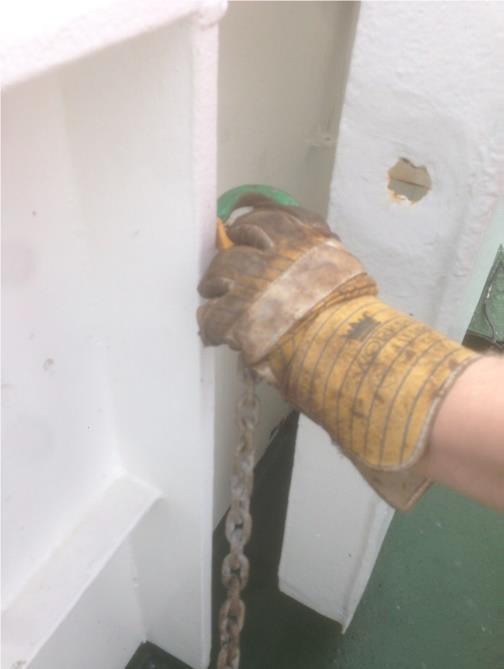Injured finger during cargo operations
What happened?
During cargo operations, a crewman got his finger stuck between the cargo and the lifting chain. The incident occurred when a vessel was discharging modules with a weight of 220 tonnes direct from the vessel to a trailer on the quay. One hook of a chain tackle which was connected to the cargo, fell off. The other hook was still connected to the trailer. When reconnecting the hook that fell off, a sudden movement of the module meant that one finger got stuck between the module and the chain. When the module swung back the crewmember was able to remove his hand. His finger was seriously damaged, and he had to be sent to hospital for X-ray and stitches. He came back onboard some hours later.
Our member noted:
- The lifting was taking place at a relatively unsheltered location; there was some vessel movement from swell, but this was considered to be within acceptable limits;
- The crew were experienced in this discharge operation; it was second time the ship was discharging in this port.

What went wrong? What were the causes?
- There had been a change of plan, for which there had been insufficient management of change (MoC). The company has a technique for use in exposed harbours where swell is an issue. It was felt that there was insufficient equipment available for that technique to be used safely, so the decision was made to land the cargo straight on the trailer, using chain tackles to reduce the horizontal motion;
- No job hazard analysis or toolbox talk took place for the alternative lifting technique; this is considered to be the cause of the incident.
What actions were taken?
- New technique was to be developed for landing cargo in a swell port, based on tools/equipment the company used in another product group (cross learning).
Members may wish to review the following incidents, both of which have inadequate management of change (MoC) as a casual factor:
See also Guidelines for management of change (IMCA SEL 001)
Safety Event
Published: 27 July 2018
Download: IMCA SF 16/18
IMCA Safety Flashes
Submit a Report
IMCA Safety Flashes summarise key safety matters and incidents, allowing lessons to be more easily learnt for the benefit of all. The effectiveness of the IMCA Safety Flash system depends on Members sharing information and so avoiding repeat incidents. Please consider adding safetyreports@imca-int.com to your internal distribution list for safety alerts or manually submitting information on incidents you consider may be relevant. All information is anonymised or sanitised, as appropriate.
IMCA’s store terms and conditions (https://www.imca-int.com/legal-notices/terms/) apply to all downloads from IMCA’s website, including this document.
IMCA makes every effort to ensure the accuracy and reliability of the data contained in the documents it publishes, but IMCA shall not be liable for any guidance and/or recommendation and/or statement herein contained. The information contained in this document does not fulfil or replace any individual’s or Member's legal, regulatory or other duties or obligations in respect of their operations. Individuals and Members remain solely responsible for the safe, lawful and proper conduct of their operations.
